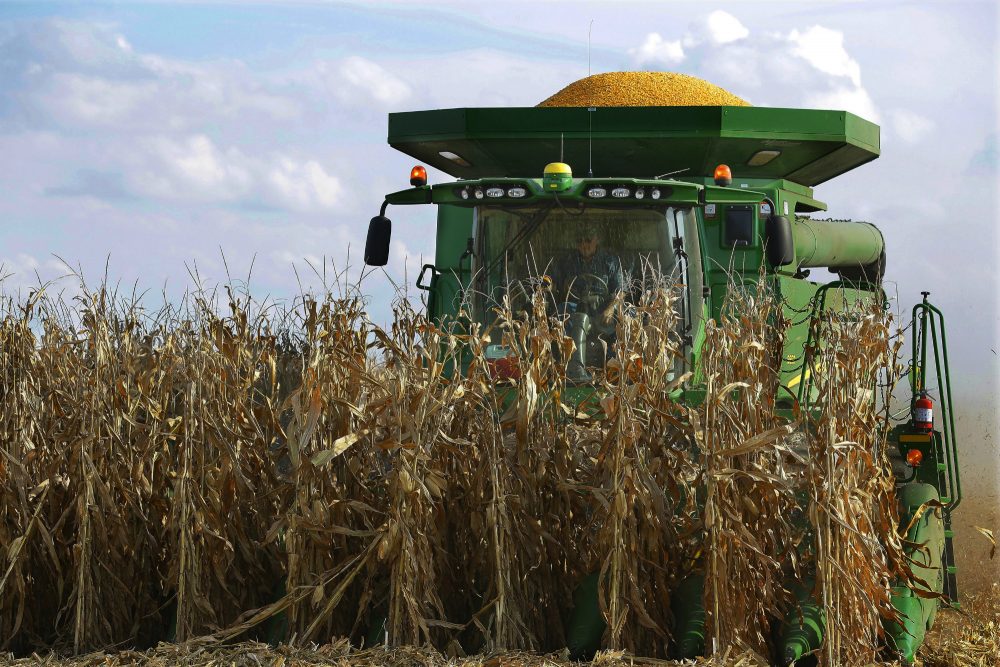Advertisement
Feeding Ourselves, And The World

Here’s a problem that’s gotten scant attention in the presidential campaign despite being as fundamental as breathing: How will we, and the world, feed ourselves?
The question arises because of two challenges. First, the Obama administration, for all the good it’s done, has failed to tame the agricultural industrial complex, which harms our health, environment, wallets and livestock. Second, the United Nations says that we’ll have to double food production to feed the 9 billion humans expected to be on the planet in 2050. Guess who wants a piece of that action? That’s right: the ag industrial complex.
While vanquishing government regulation, Big Food has had to bend, however gradually, to the marketplace.
Writing in The New York Times, Michael Pollan offered a litany of the Obama administration's setbacks in dealing with Big Food, including having to drop proposed regulations against anti-competitive practices, despite public testimony from small ranchers and farmers; watching pliant congressional Republicans kill voluntary guidelines curbing the marketing of unhealthy food to kids; and, “for whatever reason,” as Pollan wrote, a decision to exempt agriculture from Obama’s effort to regulate greenhouse gases.
Pollan noted one bright side: While vanquishing government regulation, Big Food has had to bend, however gradually, to the marketplace. The giants oppose requirements to label genetically modified food, but consumers overwhelmingly support such transparency. Meanwhile, reformers leaned on big food retailers — Walmart, McDonald’s, Burger King, Subway, Chipotle — to sign an agreement to raise wages and improve working conditions for Florida tomato pickers, “some of the most underpaid and ill-treated workers in the country,” according to Pollan.
That capitalism is nudging the public interest in this instance will shock corporate apologists and Bernie Sanders’s fans alike. Still, it’s clear that regulators will have to step up their game in the future if Big Food’s big sins are to be rectified.
Those are the hurdles on the domestic front. What about the international arena and the coming challenge of 9 billion mouths to feed? Doesn't bigger demand call for bigger production?
Well, no. As the Environmental Working Group, a Washington, D.C.-based advocate of healthy, environmentally benign food and consumer products, points out, “Agribusinesses such as Monsanto sometimes cite the so-called ‘moral imperative’ to feed a world in order to defend the status quo farm policy and deflect attention from the destruction that ‘modern’ agriculture is inflicting on the environment and human health.”
The deputy-general of the U.N.’s Food and Agriculture Organization would seem to agree, arguing that, in fact, future needs render current agricultural practices unsustainable: “What we are still mostly seeing is a model of production that cannot prevent the degradation of soils and the loss of biodiversity — both of which are essential goods, especially for future generations.”
The answer, then, is to help struggling countries feed themselves by aiding small farmers to up their production with environmentally sustainable practices. Big Food won't have a big role in feeding those hungry nations; UN data show that, measured by monetary value, a mere one-half of one percent of U.S. agricultural exports go to 19 countries with chronic hunger.
What about the international arena and the coming challenge of 9 billion mouths to feed? Doesn't bigger demand call for bigger production?
So if domestic and foreign needs demand reform, will the next president deliver? Donald Trump’s website ignores the issue, while Hillary Clinton’s calls for expanding existing programs to train future farmers and create local and regional farmers’ markets and food supply chains.
Pollan is pessimistic. “Donald Trump professes to love fast food,” he wrote, “and Hillary Clinton has longstanding ties to Big Food: Tyson was one of Bill Clinton’s first political patrons, and as a lawyer in Arkansas, Hillary Clinton served on the board at Walmart. (Though as a New York senator, she worked hard on behalf of small upstate farmers, so perhaps there is hope.)”
The question stands: How will we feed ourselves and the world? By electing a president who offers hope for reform; by leaning on a newly-elected president and Congress to embrace needed changes; and by exercising our rights as both consumers demanding better food, and as voters demanding better governance over how that food is produced.
